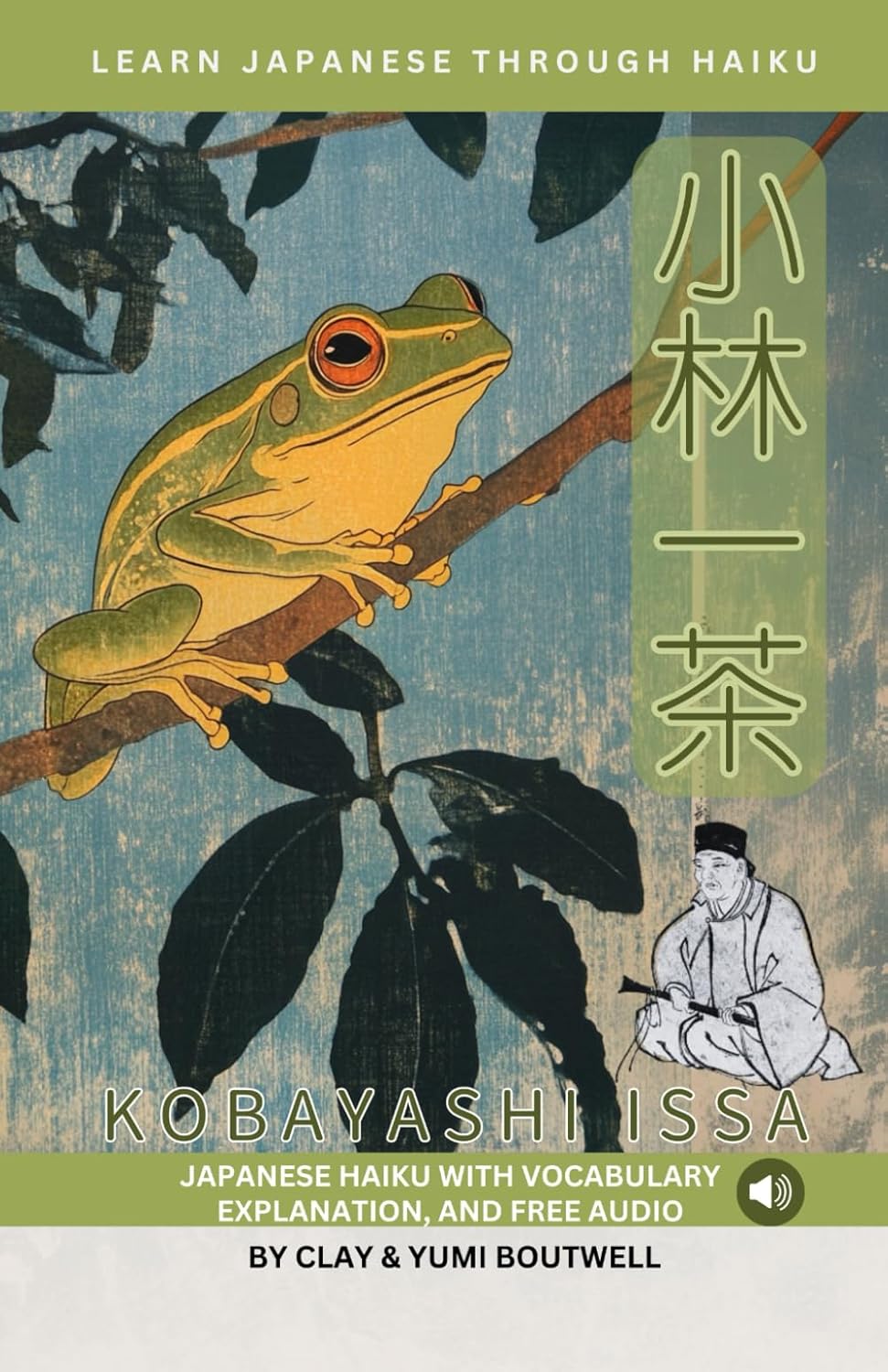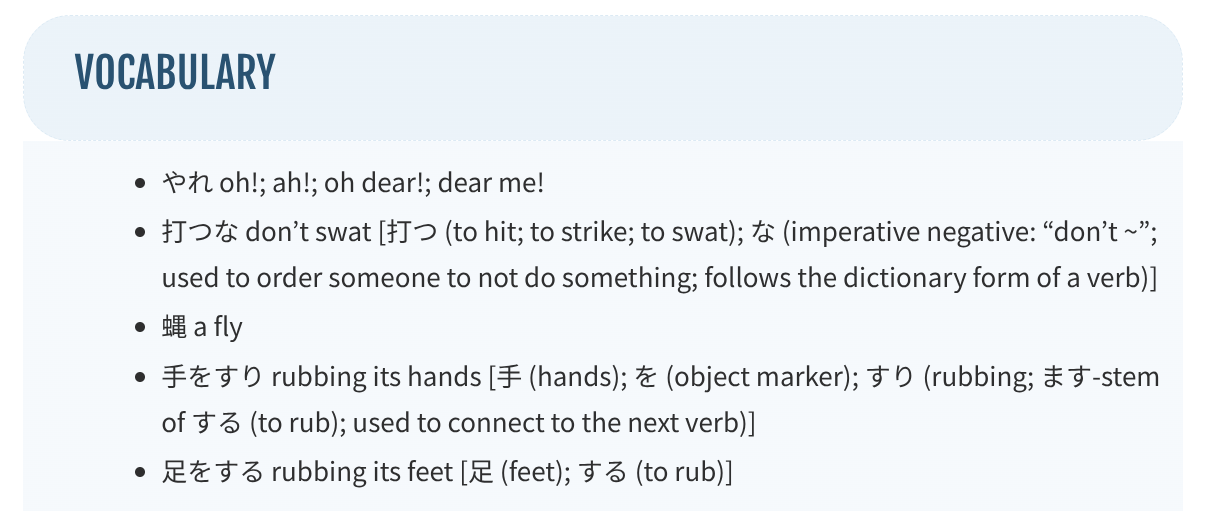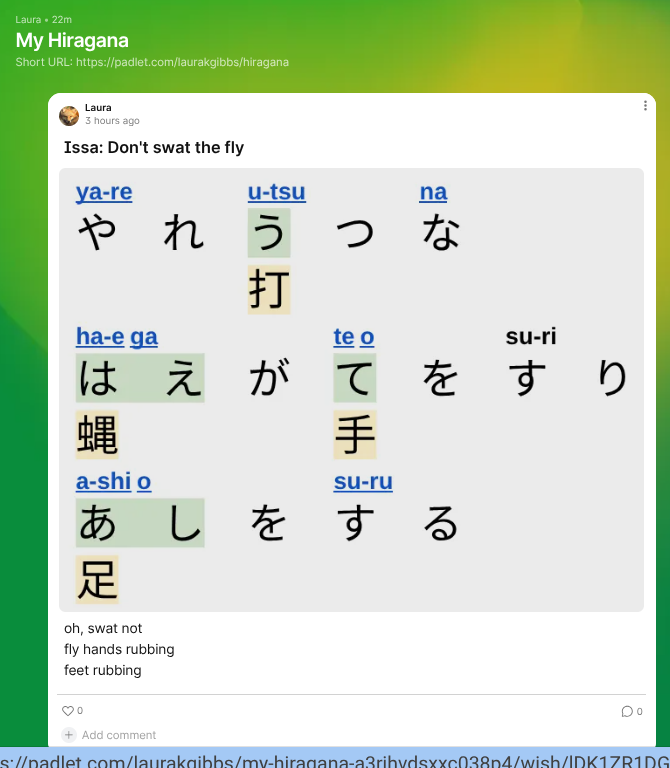Today was my first haiku-hiragana adventure, and it went great! Although it took a while to get things sorted out, I found all the tools and resources that I need to read a haiku in Japanese and to gain some real understanding of the poetry this way. I am so grateful to Clay and Yumi Boutwell for their Learn Japanese through Haiku books, and of course I started with the Issa book since he is my favorite.

Even better: the first haiku in that book turned out to be one of my favorite poems by Issa! My goal is to create some children's versions of these classic poems, with an emphasis on easy vocabulary for young readers, so here is my version of this famous haiku:
Oh, don't swat the fly!
it's rubbing its little hands
and its little feet.
(Yes, that's 5-7-5 syllables which I think is a good approach to haiku for children, helping them to learn about syllables, recognizing each syllable and then counting them; more about haiku for children in another post soon.)
Here is a very literal rendering of the Japanese as I understand it:
Oh, swat not!
fly hands is-rubbing
feet is-rubbing
Here is the Boutwells' translation:
Oh, don’t kill that fly!
it’s wringing its hands
wringing its feet
Of course, I don't know any grammar, so thank goodness for the notes from the Boutwells; here's a screenshot of the kind of help they provide. Now that I am a member of their website, I can access the haiku directly at the site as well as reading from the book (accessing the haiku at the site makes listening to the audio easier for me):

For comparison, here is Blyth's translation (who calls this Issa's "best known poem"):
Do not kill the fly:
See how it wrings its hands;
See how it wrings its feet!
Using the presentation of the hiragana and kanji in the book, with some help from the romanization, I was able to start learning how to write the hiragana; I'm not going to try any kanji for a while, although it is fun to learn about them! There were 15 different hiragana in today's haiku, and 4 kanji. That is too many hiragana for me to learn at once, so I decided to pick 4 to focus on, the hiragana used in the opening word yare (oh!) やれ, and the hiragana for the word hae (fly) はえ. That is not too much to learn for one day, and I should be able to learn all the hiragana in a month or so at this rate.
I was excited to find a browser-based keyboard for typing the hiragana! That allowed me to look up words at the Wiktionary, and I was also able to copy-and-paste the kanji into the Wiktionary also. Wow! I use the Wiktionary every day for my Latin and Greek work, so I was really happy to see the detailed Japanese entries for both the hiragana and the kanji. For example, here is the entry for やれ. This entry then led me to やれやれ (yareyare), a reduplicated form. How cool is that?
So, I made a document where I linked to all the words and particles in the Wiktionary, and I also made a Padlet which I can access on my phone. That way I can practice reciting while I am out walking, while visualizing the hiragana too. And the kanji, for that matter — the one for the fly is so cool: 蝿.

There's only one post so far, but it will be fun to keep adding posts; I set the display to random so when there are more posts, a different post will come up at random each time.
With these four Learn Japanese through Haiku books from the Boutwells, I should be able to fully learn the hiragana, and that means I'll then feel confident about collecting poems from other sources, like Blyth's books, which provide the Japanese text along with the English translation (with or without romanization); here's Blyth for example:

I just cannot believe what great resources there are for me to draw on for all this haiku work. Every time I read a translation from Japanese, I know that the translator is making all kinds of choices, and now I will slowly slowly gain the skills I need to try to see through the English translation back to the Japanese haiku itself.